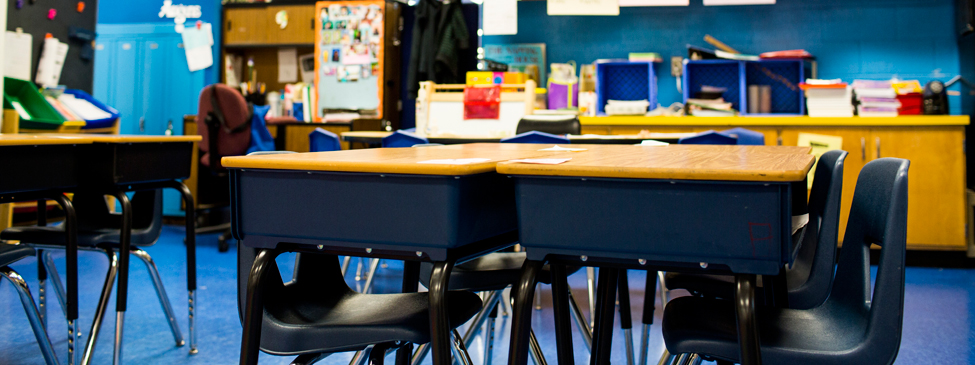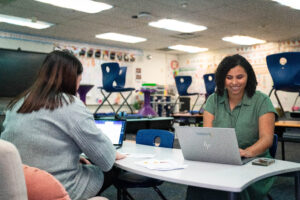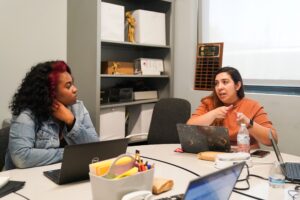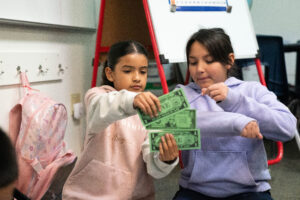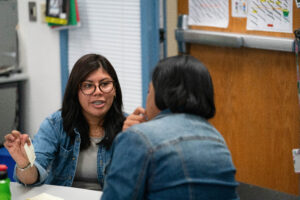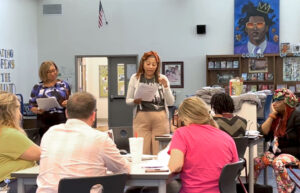Bruce Robinson is the president of Saints John Neumann and Maria Goretti Catholic High School in Philadelphia. Inspired to make a difference in his home city after retiring, he dove head first into his new role: In just two years under his leadership, Neumann Goretti has made dramatic changes to shift the school culture and improve student experiences. TNTP has partnered with Neumann Goretti since last spring to help Bruce reach his vision of preparing all students, regardless of background, to succeed in college and life. Recently, we checked in to ask Bruce about the progress he’s made so far.
Most people probably don’t think of leading a struggling school as a relaxing way to spend their retirement. What made you want to become president of Neumann Goretti?
I spent all of my career in the business world, although I taught both undergraduates and graduate students at Drexel. I was retired for a few years, but I was looking for opportunities to give back. When I was approached by the Archdiocese of Philadelphia to look at running one of their schools, I asked them what their biggest problem was. They said, “Our biggest concern is Neumann Goretti in south Philadelphia.” That was perfect. I wanted the biggest challenge out there.
What was Neumann Goretti up against?
There had been a steep decline in enrollment, a problem plaguing Catholic schools in Philadelphia for more than 20 years. The big issue, in my opinion, was the perception by families, students, teachers, and community members that the quality of education at our school was not as good as other options in the area. There was a perception this school only cared about athletics, not academics. My goal was to change that.
What did you feel like you had to tackle first, and why? And how did you do that?
First we needed a great principal. In high school, the archdiocese has a president/principal model: The president oversees the entire school, but the principal is responsible for academic offerings.
I knew if we were trying to change people's view of this school, we needed a leader who felt every kid deserves an opportunity for a great education, who was willing to fight for change, and who was willing to withstand pressure from either teachers or parents who might think because our approach is different, it isn't a good thing. We found that person.
Then, the first year became about changing perceptions. We needed to just listen, find out what the root problems were, and start drawing a roadmap to get from where we were to where we wanted to be.
How did you go about changing those perceptions?
We set out to raise the bar for students and faculty. We offered free college courses at night to our students. We offered no-cost SAT review. These were all things that started making not only our existing students, but also families outside our building, take notice that this wasn't the same school it always was.
We also worked with the teachers union to begin the year with an influx of new teachers. These teachers embraced our new higher bar for students, and a more frequent and proactive approach to coaching teachers. We’re now getting administrators to visit classrooms on a regular basis to observe. And we’re working to align our teachers to an instructional model that is more likely to connect with our students. Standing in front of a classroom and delivering instruction has been proven to not be very effective. We’re working with teachers to get kids to become more critical thinkers, not just memorizers of data, repeating back facts. We want our kids to be independent thinkers, and we want our teachers to be coaches to help students achieve those results.
We applied for a planning grant from the Philadelphia School Partnership, and received it because they believed we had the leadership in place to effect change. That allowed us to partner with TNTP over the last half of the school year to gather data from surveys and classroom visits with parents, students, and teachers.
What did you learn from these surveys?
We learned what else needed work. For instance, we had a tracking system, and we realized lower performing students were not being pushed or getting the same educational opportunities as others. So we eliminated it. We now have an honors track that includes advanced placement courses, and a college prep track. We believe everybody coming to this school is going to college.
Related to that, the surveys also showed we had weaknesses in treating all students equally. Students were having different experiences, based on race or ethnicity or gender or honors versus not honors. We’re an inner‑city school with a diverse student population. It’s important that all students feel welcome and supported. And there are many ways you can have a blind spot when it comes to treating students equally and fairly.
During our pre‑school professional development, we brought in an outside party to have a specific session on overcoming prejudices—how to look at all students and say, “Everybody here can achieve, and everybody here can be successful.” We made a concentrated effort to create an environment where there is mutual respect. In the hallway last year, you might've heard a lot of screaming. If you walk down a hallway now, you never hear that. It's entirely different, and it goes to show that when teachers and students treat each other with respect, kids are less likely to feel provoked, and more likely to follow rules.
What's next for Neumann Goretti?
Academically, we need to continue to coach our teachers, having our teachers experience growth and, as a byproduct of that growth, improving student outcomes.
All of the work of this past year created a different environment. Now, the idea of higher expectations for students and teachers is a reality in our building. It’s not just something we talk about, it’s actually happening. But like any turnaround, it doesn't happen overnight. We're in the beginning of the cycle of trying to make this school better.
